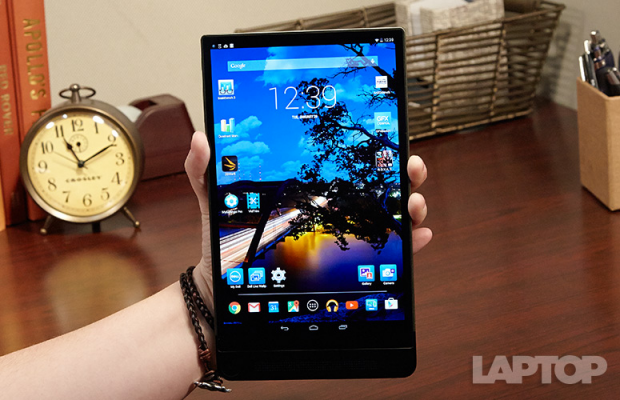Android Tablets Are Dying - And That's Great News
Dell just put another nail in the Android tablet coffin. The company announced that it is killing off its Android-powered Venue slates. As more and more consumers use bigger phones and people hold on to their existing devices longer, tablet sales have been crashing for a while. But Android tablets are particularly pointless.
“The slate tablet market is over-saturated and is experiencing declining demand from consumers, so we’ve decided to discontinue the Android-based Venue tablet line,” a Dell spokesman told PCWorld.
The irony is that the Dell Venue 8 7000 is one of the best-rated Android tablets we've reviewed, sporting a gorgeous OLED display and an innovative RealSense camera. The problem is that no one really needs an Android tablet anymore--and that they've always trailed the iPad in one critical area.
For years, Android tablet apps have paled in comparison to Apple's rich selection of tablet-optimized apps. Many titles are just stretched-out phone apps, while iPad developers have found better ways to take advantage of the available real estate, as well as pen input with the latest iPad Pro. At least games play as well on Android tablets as they do phones.
MORE: Best Chromebooks Available Now
Speaking of phones, Android tablets are becoming irrelevant because no one needs a 7 or 8-inch slab that does the same thing as a big-screen phablet. The experience between using a phone and tablet just isn't differentiated enough. And you can pick up a large 5.5-inch handset for cheap, like the $199 Huawei Honor 5x.
There's yet another reason Android tablets are on death's door; they're transforming into something else: Chromebooks. Now that Android apps run on Chrome OS devices, you're starting to see more Chromebooks with touchscreens build in. The Asus Chromebook Flip was just the start. HP just announced the Chromebook 11 G5 with a touchscreen, and more are on the way.
Sign up to receive The Snapshot, a free special dispatch from Laptop Mag, in your inbox.
Android tablets are dying, but Chromebooks with touch could essentially give the category new life as a 2-in-1 combo. According to IDC, detachable devices like the Surface experienced triple-digit growth year over year in the first quarter of 2016, while the rest of the tablet market declined by 14.7 percent.
For now, most touchscreen Chromebooks are convertible clamshells, but I expect to see detachables proliferate by the end of the year. In fact, the Chromebook Pixel C would have been much more satisfying a hybrid if it ran Chrome OS with an Android store on top.
I'm not saying that Chrome-tablets are going to take down prosumer devices like the Surface Pro 4. But for consumers focused on value, as well as students, touch-friendly Chromebooks that run Android apps and games could provide a great mix of ease of use and versatility.
So don't cry for Android tablets. They're just finding a new home.
Laptop Guide
- Laptop Buying Guide: 8 Essential Tips
- The Best & Worst Laptop Brands
- Laptop Tech Support Showdown: Undercover Report
- Should I Buy a Chromebook? Buying Guide and Advice
- Laptops with the Longest Battery Life
- Chromebooks vs. Windows 10 Laptops: What Should You Buy?
- Why You Shouldn't Buy a Touch-Screen Laptop
- Out of the Box Tips: Set Up Your New Laptop Like a Pro
- The Best Time to Buy a Laptop
- Chromebook vs. Tablet: Which Should You Buy?
- Laptop Buying Tips for Students
- 10 Key Features to Look for in Your Laptop
- How to Buy a 2-in-1 Laptop Hybrid
- USB Type-C FAQ: Everything You Need to Know
- How to Get Rid of Your Old Laptop
- Laptop Warranties: What They Cover
- Which CPU is Right For You?
- Which Laptop Features Are Worth the Money?
- Gaming Laptop Buying Guide: Find the Right Rig
- 10 Reasons Why Consumers Should Buy Business Laptops
- Which MacBook is Right for You?
- 5 Things to Look For in Your Next Laptop Keyboard
- How to Configure Your Laptop: Specs That Matter
- Which Graphics Card Do You Need?
- The Perfect Laptop? Here’s What It Should Have
- Why 78 Percent of Laptop Screens Suck
- A Guide to Computer Ports and Adapters
- 13 Ways to Make a Slow Laptop Faster
- How to Tell If You Can Upgrade Your Laptop
- Laptop Locks Guide: Do You Need One?
- 10 Features You Can Skip to Save Money


